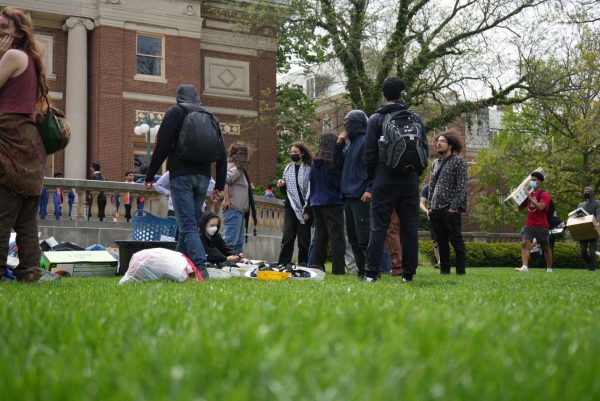Death in a digital age
March 9, 2006
“I am coming to see you in 8 days!!!!!” wrote Lisa Stoller, then a freshman at Indiana University, to University freshman Sarah Channick on Sept. 22, 2005. Seven days later, Channick was killed when she was struck by an Champaign-Urbana Mass Transit District bus on campus.
“On Facebook, we had a countdown, as the days got closer, of when I was going to be there,” Stoller recalled in an e-mail interview. Now a student at College of Lake County, Stoller said she had been packing for her trip from Bloomington, Ind. to Champaign the day Channick died.
Stoller said she left her message on Channick’s Facebook “wall,” or message board. Facebook, an online community with nearly nine million college and high school users, is widely popular among University students. Online communities allow users to create profiles listing a person’s favorites, friends and even relationship status.
While these online communities are popular, not many people think about what should be done with them after someone dies. Should messages and other profile details remain public after someone’s death? And if so, for how long?
“I have mixed feelings about her Facebook page,” Stoller said. “I think that her spirit is being kept alive enough without it because she touched so many people’s hearts.”
Get The Daily Illini in your inbox!
Some online communities, including Facebook, as well as e-mail services like Yahoo!, will not grant account access to next of kin. Because young people are the most likely to have digital property, their unexpected deaths may leave friends and family pondering what exactly to do with their loved ones’ digital existence.
Facebook maintains a policy, upon notification of a death, to terminate the account. Channick’s profile was removed in early November. Spokesperson for Facebook, Chris Hughes, said the site cannot leave a deceased person’s profile active.
“Because the person is deceased, there is no way to verify the appropriateness of comments or information posted,” Hughes said. He said students, family or media sources often inform the company of deaths, and families may have a copy of the web page.
“We can take screen shots of profiles if family members want to see the information, but we can’t give them access,” Hughes said.
Without a gatekeeper, a person’s page could end up full of painful comments or misrepresentation. When 21-year-old Illinois State University (ISU) senior Olamide Adeyooye went missing on Oct. 13, one user left the message: “It’s a shame that (you’re) missing… you’re pretty hot…” on her MySpace.com site.
Adeyooye was found dead on Oct. 21 in Mississippi. Yet on Nov. 22, another user left a message on her profile inviting her out to a bar during Thanksgiving break.
Adeyooye’s friend, Ashley Petrey, a senior at ISU, said she had to send several messages to the sender, asking him to take down his comment, which was posted publicly. He obliged after a week. Petrey said that despite the setbacks, the page has become a memorial to Adeyooye, and people use it to heal and remember.
“I don’t really think it’s appropriate to ever take down,” Petrey said. “It’s like a slice of her life captured in time from that day (she died), and her beauty, thoughts and words can live on for a long time.”
Petrey has little to worry about it seems. Adeyooye’s profile still remains active almost five months after her death. In the most recent message, her boyfriend at the time of her passing left a note for her on Valentine’s Day.
“Baby I miss you,” he wrote. “Happy Valentines Day. I should be giving you flowers and taking you out to dinner and a movie.” Adeyooye has received 29 public comments on MySpace since the confirmation of her death.
Stoller said while Channick’s page gave an insight into her life, it is good that it was taken down.
“I didn’t get to meet a lot of her friends at U of I, but I was able to see a lot of them through Facebook, and I saw the nice things they would say about her on her wall,” she said. “I think having the page still up would be too painful.”
Profiles of deceased teens and twentysomethings often become tributes to their lives when they die and what Petrey likened to a “giant guestbook at a funeral.”
Friends write notes to the person who passed. There may often be a cusp in messages, at which point the mundane messages a person received in life become a litany of tribute notes. On Channick’s page the night before her death, Channick’s friend jokingly remarked, “I don’t mean to sound creepy or anything, but I’m KIND of obsessed with you.”
The next comment from another friend says, “Thank you for being such a compassionate person. You will be truly missed. Life is precious, take nothing for granted.” From there, comment after comment, addressed to Channick, expressed sentiments such as, “R.I.P,” and, “You’re in a better place.”
University clinical counselor, Dr. John D. Powell, said leaving a person’s profile up for awhile after his or her death helps friends cope.
“It’s therapeutic,” Powell said. “It gives people an opportunity to express themselves that they may not take otherwise.”
“It lets people know they’re having a shared experience with other people. We realize we have the same thoughts, the same feelings, the same fears and realize we’re sharing the experience.”
Powell said like any remaining personal items, the online profile must be taken down to help complete the grieving process.
“When somebody dies, (someone) that you see on a daily basis, you have to realize that person’s not coming back to the room,” Powell said. “You can’t leave their room the way it was.”
Powell said to come to grips with reality, the profile page needs to come down, but it needs to happen in a way that fits people’s timing.
“I think taking a person’s page down is probably very painful and very traumatic for some people,” he said. “But also very real and very necessary.”
A profile is just one piece of digital property one might keep along with phone messages, e-mails or a screen name on the instant message list, Powell said.
“Just because someone’s dead, doesn’t mean erasing all of their existence is a good thing,” Petrey said. “Until they cancelled (Olamide’s) cell phone, I would call and listen to her voicemail just to hear her voice.”
Powell said it is easier to type out a tribute to a person, than it might be to gather people together to talk about the death. However, he said many students are typing out messages in lieu of personal contact, which takes the human element out of the grieving process.
“What’s missing is that, a lot of people, when they’re grieving really need a hug, a soothing voice – that flesh and blood, face-to-face comfort,” he said.






